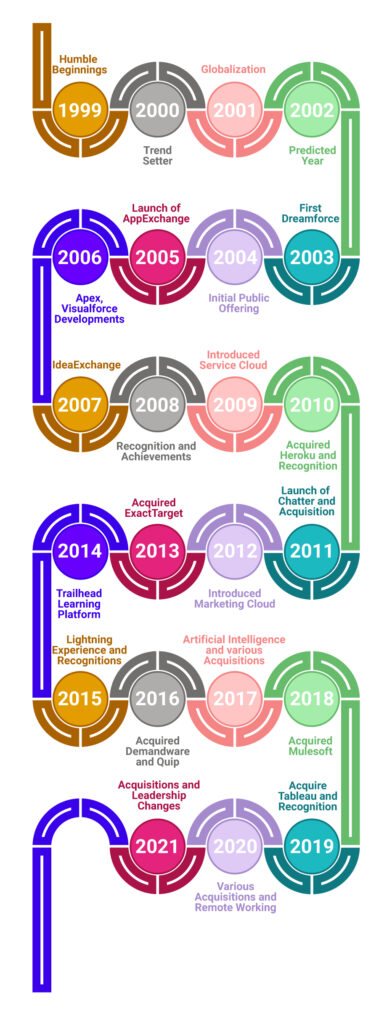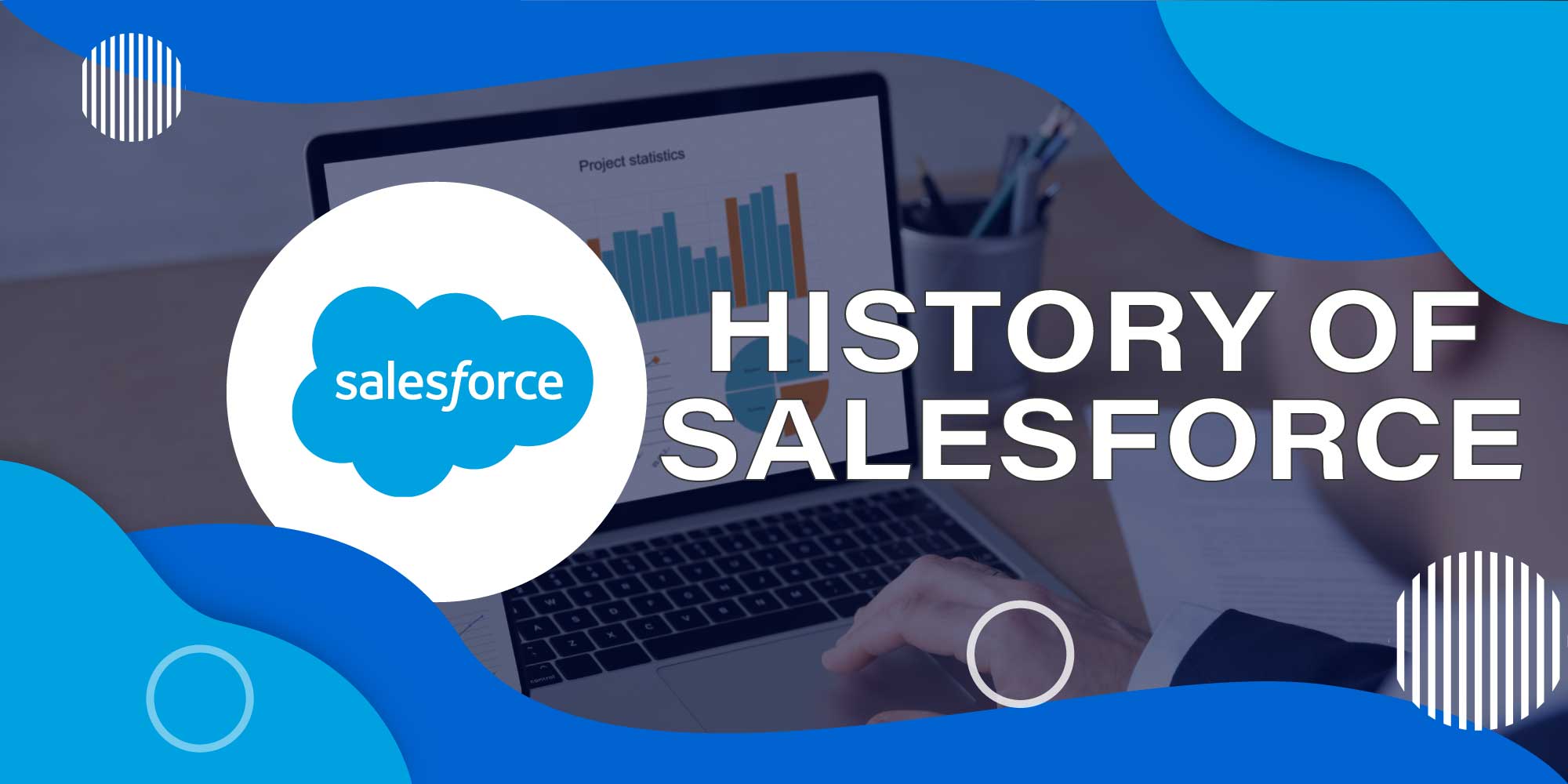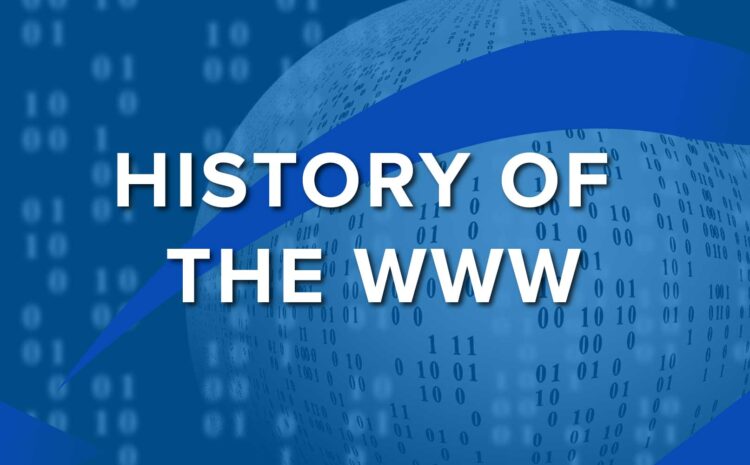Welcome to another “History of” post! Today, we dive into Salesforce. We hope you pick up some interesting tidbits you might not have known before. Let’s get going.
Many people may think of Salesforce as a sales-force-driven organization. That would be wrong; in this article, we will provide you with a brief history of Salesforce as well as explain their relationship with CloudQ.
I have read and referred to several articles about history, all of which have some unique writings. As a result, we decided to try something fresh.
In recent years, cloud computing has experienced a tremendous growth in popularity. Salesforce is one such technology that has had a massive impact on the world of computing. They just celebrated their 22nd anniversary in March of 2021.
Let’s go through a virtual journey of Salesforce.
How Did It All Begin?
The thrilling tale of Salesforce begins in the late 1990s when the world was grappling with the issue of bundled software. As a result, software was packaged and offered to clients at a premium price. Because of that, software installation, modification, and maintenance costs rose. Everything is tied to everything else, and software is no exception.
Marc, a common employee from Oracle, came up with the groundbreaking concept of altering the software installation method. To make this vision a reality and build a CRM company at that time required a lot of guts. Consider that just 4% of the world’s population used the internet, and e-commerce had yet to take off, it was a huge gamble. Many people were hostile to the idea, and investment firms were hesitant to invest since they preferred large corporations.
In these conditions, Marc Benioff shared his vision with three Oracle colleagues: Parker Harris, Dave Moellenhoff, and Frank Dominguez. They got together and launched Salesforce in 1999. They began by concentrating on software-as-a-service (SaaS), with sales automation software as the first product supplied to customers.
RoadMap from Humble Beginning to Giant

What is Salesforce?
Salesforce is the world’s leading CRM platform, allowing businesses to sell and market their services like never before. It is the customer success platform that enables you to engage with your consumers in an entirely new way. Salesforce acts as your company’s infrastructure. You may be expecting that Salesforce would send a team to your DOS to build up infrastructure.
I’m sorry if this is what you’re thinking right now, but you’re mistaken. I didn’t mean to mislead you, but don’t be worried! Salesforce is built on a cloud infrastructure. If a company needs infrastructure, it must pay Salesforce to use what they’ve built, but it’s there for you to use.
Technologies used by Salesforce:
- Apex
- Visualforce
- Compiler
Upsides of Salesforce:
If you are new to CRM or have had a poor experience with another CRM, Salesforce CRM might be the key to your success. The following are the reasons why Salesforce is important:
- Flexibility
- Excellent functionality
- Excellent performance
- High-level security
- Easy Integration
- Pricing
- Innovation
- Easy to use
- Trust
- Easily Customizable
- AppExchange
What is Salesforce used for?
To cut short where companies and customers meet with a 360-degree platform that makes the service so appealing. Businesses can sell better by leveraging the platform and its features, moving prospects from lead to cash to commitment. Salesforce promotes its sophisticated algorithm for producing more creative agents.
Pandemics and Salesforce
In a recent interview, Benioff said after the epidemic, he expects 50% or more of his company’s workers to continue working from home. “We’ve developed a whole new universe, a new digital future, and it’s already happening.” Marc has also offered the Salesforce Health Cloud available for free to emergency response teams, contact centers, and health-care management teams in coronavirus-affected networks.
To speed private and public sector responses to the COVID-19 epidemic, Salesforce introduced Work.com in May 2020, a collection of technology and services designed to help businesses reopen quickly and safely.
Salesforce in the Future
By the end of 2021, Artificial Intelligence technology is expected to have a massive influence on the CRM business.
Salesforce introduced Einstein Automate at Dreamforce 2020, a workflow development solution that integrates MuleSoft technologies and robotic process automation. Einstein is a cloud-based platform, a Salesforce product, and is a rebranded analytics application that was formerly known as Wave Analytics.
Salesforce+, a brand-new streaming service with engaging live and on-demand content for every position, sector, and line of business, is now available.
Salesforce Voice + AI Integration is curious about the limits of artificial intelligence. The integration of voice with Service Cloud allows for real-time voice transcription.
Currently, I see a high need for competent Salesforce Engineers, which is mostly impacted by the large number of people that utilize the platform. Salesforce is now the world’s fifth-largest software corporation.
CloudQ’s Relationship with Salesforce
In 2013, CloudQ, then known as Syrainfotek, was founded. Grown from a garage start-up to over 200 employees across multiple countries today, CloudQ is recognized as one of the fastest growing private companies in the US, ranked by INC. 5000 four years in a row.
CloudQ is Level I and Level II Navigator Service Specialists with Salesforce. We have completed 100+ projects in Salesforce in various customizations, as suggested by the customers.
If you enjoyed this “History of” post, we invite you to check out some of the others we’ve done, and we hope to see you back here for the next one.

 Linkedin
Linkedin


